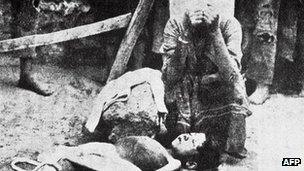Turkey recalls envoy from France over 'genocide' bill
- Published

Armenians say up to 1.5m people were killed by the Ottoman Turks in 1915-16
The Turkish ambassador to France has been recalled in protest at a bill making it illegal to deny the mass killing of Armenians was genocide.
The National Assembly in Paris voted by a show of hands to back the bill by a large majority, and it will go before the Senate next year.
Turkey rejects the term "genocide" to describe the killing of Armenians under the Ottoman Empire.
French Foreign Minister Alain Juppe publicly opposed the bill.
Under the bill, those publicly denying genocide would face a year in jail and a fine of 45,000 euros (£29,000: $58,000).
Armenians say up to 1.5m people were killed by the Ottoman Turks in 1915-16.
Ankara says closer to 300,000 people died, and that Turks were also killed as Armenians rose up against the Ottoman Empire when Russian troops invaded eastern Anatolia, now eastern Turkey.
More than 20 countries have formally recognised the killings as genocide.
'Inspired by European law'
Turkish TV announced the recall of the country's envoy in response to the bill.
Ambassador Tahsin Burcuoglu will leave France on Friday and further measures will be announced in Turkey by Prime Minister Recep Tayyip Erdogan, a Turkish embassy spokesman confirmed for French news agency AFP.
Earlier, Turkey's main political parties issued a joint statement condemning the bill, saying it "denigrates Turkish history", and there have been protests outside the French embassy in the Turkish capital, Ankara.
The bill's author, Valerie Boyer from France's ruling conservative UMP party, said she was "shocked" at Turkey's intervention.
"My bill doesn't aim at any particular country," she said.
"It is inspired by European law, which says that the people who deny the existence of the genocides must be sanctioned."
Jean-Christophe Lagarde, an MP from the New Centre party, said: "Laws voted in this chamber cannot be dictated by Ankara."
Maurice Delighazarian, 75, lost his grandparents in 1915.
"Our ancestors can finally rest in peace," he was quoted as saying by the Associated Press news agency in Paris.
Armenian Foreign Minister Edward Nalbandian thanked the French parliament for supporting the bill.
"I would like to once again express my gratitude to France's top leadership, to the National Assembly, and to the French people," he told AFP in the Armenian capital Yerevan.
He added that France had "once again proved its commitment to universal human values".
'Counter-productive'
Mr Juppe criticised the proposed law, which follows France's formal recognition of the killings as genocide in 2001. No penalty was attached for denial at the time.
Mr Juppe told reporters it was a critical juncture in the Middle East and he emphasised the role Turkey had been playing in the Arab Spring, as well as the strong economic ties that existed between Turkey and France.
"It [the bill] is useless and counter-productive," he said.
"Passing laws in France won't change their minds in Turkey. We recognise the consequences. I would expect a robust Turkish response. The retaliation could have damaging and serious consequences."
His disapproval appears to be in direct conflict with the tacit support that has been given by President Nicolas Sarkozy to the bill, the BBC's Christian Fraser reports from Paris.
There are some half a million ethnic Armenians living in France and their vote is considered important in next year's presidential election, our correspondent notes.
- Published22 December 2011